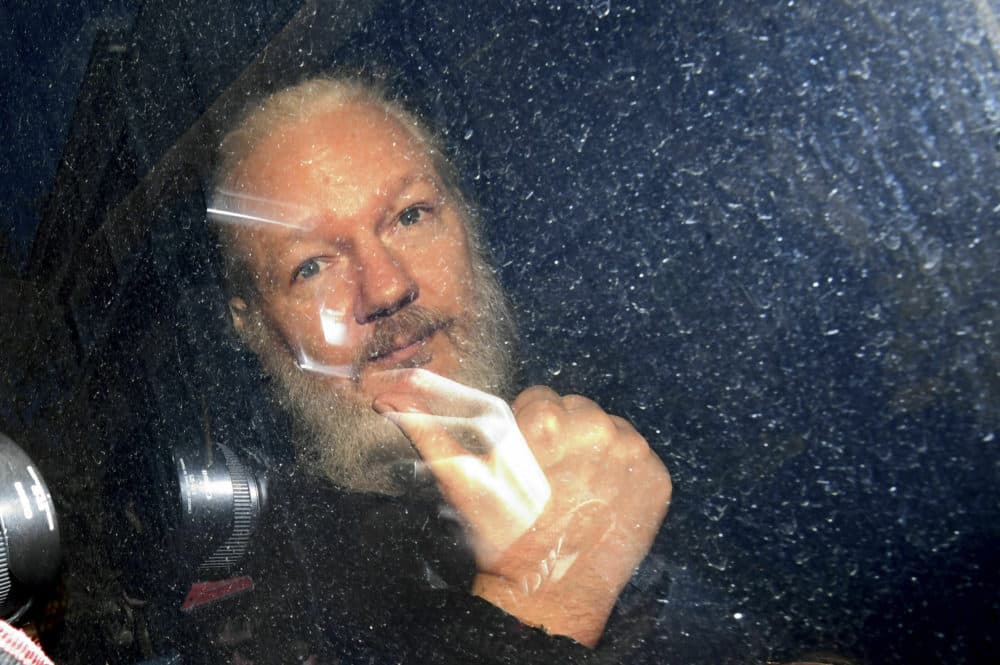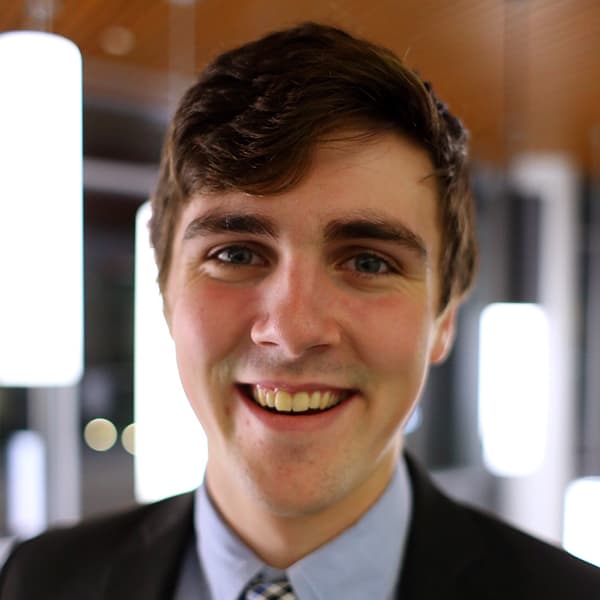Advertisement
'He Absolutely Fears Going To America': Friend Of Assange Weighs In On WikiLeaks Founder's Fate
Resume
WikiLeaks founder Julian Assange’s friend is speaking out on Assange's fate after he was arrested Thursday at the Ecuadorian Embassy in London, where he has lived in asylum for nearly seven years.
Vaughan Smith says he thinks Assange will be extradited from British prison to the U.S., which Assange “hugely” fears, according to Smith. But that process could take up to three to five years.
“He absolutely fears going to America,” Smith tells Here & Now’s Peter O’Dowd. “He thinks this is about vengeance, and I can see why he thinks that, because America does have a record of not forgiving people.”
While Smith says the U.S. doesn’t try to kill people — as Russia attempted to do in the case of a former KGB spy and his daughter in Salisbury, England, last year — it might seek to “dissuade others in a vengeful way by making an example of [Assange] and putting him in prison for life.”
Ecuadorian President Lenín Moreno says his government's decision to withdraw Assange’s asylum was the result of allegedly "aggressive behavior,” including mistreating guards and accessing embassy security files. But Smith says the Ecuadorian government is only trying to justify withdrawing someone’s asylum status, an illegal act under international law, he says.
"Imagine being too worried about surveillance, you wouldn't even open a window."
Vaughan Smith
“Julian was my house guest for 13 months,” says Smith, a freelance video journalist and the founder of the Frontline Club, a meeting place for journalists in London. “I know what he's like, and I'm afraid I'm not going to side with the Ecuadorians on this one.”
The relationship between Assange and the Ecuadorian government has “gone south” in recent years, according to Smith. Since the election of President Lenín Moreno in 2017, Ecuador has adopted different policies toward the U.S. that are “perceived as America’s will,” he says.
“During the last year, it got very difficult for Julian,” says Smith. “He lost his internet access; the surveillance on him in the embassy was doubled — there were two cameras in every room; and he was gagged, he wasn't allowed to speak to the press.
“Imagine living in one of two small rooms along the flat, where you can hear the world outside, but can't participate. Imagine being too worried about surveillance, you wouldn't even open a window.”
What caused Assange the most stress, though, was the solitude, according to Smith, who says the conditions in the embassy were worse than prison.
“A prison has a regime where you're normally expected to get some medical help,” says Smith. “He could only have a doctor or a dentist that could carry whatever they needed in, because the British government wouldn't let him have access to anything more.”
The long path that led to Assange’s arrest began in 2010 when Eric Holder, then the U.S. attorney general under President Obama, announced a criminal investigation against WikiLeaks in response to the unauthorized release of secret military documents from the Afghanistan and Iraq wars, as well as about a quarter-million confidential diplomatic cables released by whistleblower Chelsea Manning.
“A grand jury went on for years under the Obama administration,” says Scott Shane, one of the New York Times reporters who wrote about the released documents. “But they finally decided that to prosecute a publisher — Julian Assange, as head of WikiLeaks, may be a very unconventional publisher, but he was viewed as a publisher of a sort — would be too close to prosecuting an ordinary news organization.”
Ecuador granted Assange asylum in 2012 so he could avoid extradition to Sweden in connection with allegations of rape. During the first six years he was at the embassy, he was clearly running WikiLeaks, says Smith, as he had good internet access, a few people on staff and a small budget.
“It was able to deliver a great impact,” he says. “But in the last year when he lost the internet access, he wasn't able to sustain that. So, he doesn't run WikiLeaks, and he hasn't run WikiLeaks for some time now.”
WikiLeaks’ impact remains a subject up for debate. While the organization has many supporters, it also has many critics, including news organizations like The Washington Post, whose editorial board said Thursday that Assange is not a free-press hero, and that he violated journalistic standards because he didn’t vet the information he released and obtained it through illegal methods.
Shane recognizes another issue with Assange: “Sometimes he has such strong political views that they color the release of what is in many cases very valuable information.”
Still, Shane says WikiLeaks has made a big impact on history.
“I suspect it will survive even with Julian Assange’s troubles,” he says.
Jill Ryan produced and edited this interview with Tinku Ray. Jackson Cote adapted it for the web.
This segment aired on April 12, 2019.

